by Jenny Rose | Sep 13, 2018 | A Flourishing Woman, The Journey
Clarissa Pinkola Estes introduced me, years ago, to the idea of descansos in Women Who Run With the Wolves, one of the most important books I’ve ever read. Descansos is a Spanish word meaning resting places. A descanso might be a grave in an ordinary graveyard, but Estes suggests creating descansos as a spiritual practice; a method for letting go and/or acknowledging a loss; a place to put rage, fear and other feelings or destructive thoughts to rest so we don’t walk forward burdened by unresolved pain and experience.
We know grief has its own timetable. The Celts set aside a year and a day for the proper discharge of grief. Many other cultures have formal mourning periods and practices, during which people are not expected to fully participate in social responsibilities and activities. Many of us try to move away from the anguish of grief as quickly as possible, but there is no shortcut for the grieving process. Sooner or later, we must feel it and walk through it if we are to heal.
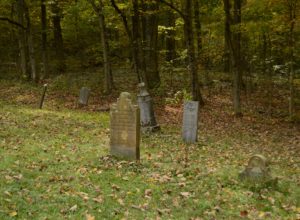
Photo by Madison Grooms on Unsplash
Loss is not just about the death of a loved one. As we journey through life we encounter many losses, including the loss of our innocence, which might take many forms; the loss of dreams; the loss of health; the loss of a job, a home, a relationship or some piece of identity. For all of these, we might make a descanso, a place where we have knelt and prayed, wept, planted flowers or a tree and marked with a cairn, a stone, a cross, or some other symbol that has meaning for us. A descanso is a quiet, private place apart from the rest of our lives, a place we can visit when autumn leaves begin to fall and the cooling air crisps with the scent of windfall apples, damp leaves and browning ferns. We pay homage to what has been, to that which we’ve blessed, released and laid to rest. We invite memory and take time to empty our cup of rage, pain or tears again.
I recently wrote about identity. This fall, it occurs to me to spread out all the pieces of my identity, past and present, try them on, one at a time, and notice how they feel. I will make descansos for those aspects of identity that no longer fit me or serve my intention going forward. I want an identity update; to replace the old versions with an identity compatible with my present life and experience, much like going through a clothes closet and culling.
In fact, that is a task I’m undertaking right now as well; going through my clothes. Perhaps that’s why I feel nostalgic and am thinking about descansos. Autumn awakens in me the desire to clean out and lighten up, literally and metaphorically. I discover my difficulty in letting go of clothing I haven’t worn in years and which no longer fits is about the memories of who I was and what I was doing while wearing it rather than the clothing itself.
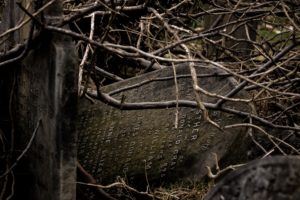
Photo by eddie howell on Unsplash
Memories can be a heavy burden. Some are precious and we never want to lose them. Other memories haunt us and keep our wounds fresh and bleeding. The remedy for all those imprisoning beliefs, pieces of negative identity, unresolved feelings and painful memories is the practice of descansos, which is to say the practice of grieving and then moving on. That order is essential. We must grieve fully and willingly, and then move on. A graveyard is not a place to pitch a tent and live the rest of our lives. It’s a place to create, visit, honor, care for and meet ourselves when old parts and pieces of our lives enter our dreams and tug at our hearts.
Making descansos is a gentle practice. It is not denial, avoidance or rejection, but rather an open-armed welcome to all our experience, followed by honest assessment and choice-making. Like clothing, identity and memories wear out, no longer fit or become too uncomfortable and outdated to be useful. Making a resting place is an intentional practice, without violence, frenzy or horror. We are not tearing ourselves apart with self-hatred, but allowing change and growth, the same way the trees are beginning to let go of their leaves and a snake sheds its skin. The practice of descansos allows us to clean up, clean out, and create space for new growth and experience. It’s an opportunity to create a place of sacred memory so we do not have to stagger under a jumbled-up load of the past.
Creating descansos is uniquely individual. Some might draw a map of their life’s journey, marking descansos along the way. Artists might paint, make music, write, create, sculpt or dance. Others might seek out a sacred place in nature for ritual, prayer and making a grave or graves.

Photo by Sandy Millar on Unsplash
When I make descansos, I think of putting a baby to bed in a dim nursery, bathed and fed, sleepy and smelling of milk, with a clean blanket and a stuffed toy. Perhaps our most brutal memories and experiences are the ones needing the tenderest descansos we can create. As we would nurture, reassure and protect an infant, we nurture, reassure and protect ourselves with the practice of descansos. We allow ourselves to suffer, release our suffering and move on, honoring the way our experience shapes and enriches us.
It’s autumn in central Maine, a good time to make new descansos and visit old ones. A good time to remember. A good time to walk under the trees and absorb the wisdom of cycles and seasons, growth and change, life and death.
A good time to allow ourselves to rest in peace.
All content on this site ©2018
Jennifer Rose
except where otherwise noted
by Jenny Rose | Jul 5, 2018 | Power
“Always forgive your enemies; nothing annoys them so much.”
― Oscar Wilde
It’s been a chaotic week for me of fear, memories, fire, grief, a couple of new friends and unfinished emotional business resulting in a foul snarl of neglected feelings. Also, in common with millions of others, we are sweltering under a heavy blanket of heat and humidity and I feel about as attractive as a slime mold.
My old home place, my old community in Colorado, is burning. I’m not there. I’m glad I’m not there.
I should be there. I hate myself for not being there.
I’ve written before about blessing the ground between us. Now my mind is filled with the ground I once lived on, and all I can see are the horrifying images of flames, smoke, and the ashy remains of structures and scorched land. I spend hours every day searching the web for updates from local command and incident centers, the local papers, TV and radio and residents who post pictures and videos. I watch interviews with old friends and weep. I see video clips of my town and it’s like a ghost town, the streets empty and everything looking sere and dry because of drought. Towers of smoke loom and the air is an eerie sullen color. This should be the height of the tourist season there, the streets busy, flowers growing, and shade trees green and cool.
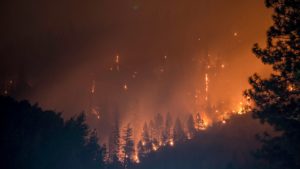
Photo by Matt Howard on Unsplash
Now there are tens of thousands of scorched acres between me and my memories of that place. I bless the ground between us. Given time and water, it will renew, but I think water is no longer a certainty and my lifetime will have run its course before the land recovers and the forests regrow. In a strange sort of way, the desolation of all that scorched earth echoes the desolation I feel as I watch nations, communities, and people become more divisive and competitive. It seems we’re getting more and more skilled all the time at scorching the ground between us, soaking it in blood and then sowing it with salt. We do not forgive differences. We carry hatred between peoples from one generation to the next, and many are at work in the world to increase the divisions by fanning the flames with rhetoric and disinformation, and pouring gasoline onto the fire in the form of resentment, ignorance, and fear.
We do not forgive. We are not forgiven.
Never have despair, powerlessness and fear seemed so darkly seductive to me as they do in these times. My experience is only an infinitesimal part of what’s happening now on Planet Earth, and I’m quite sure we have not yet descended as far as we’re going to. At times, it’s only by deliberately stoking my stubbornness and will and refusing to take my gaze away from where my power is that I continue to cling to faith in some kind of a cosmic balance and plan in spite of fear.
I’ve been spending a lot of time recently thinking about my family and dealing with some of the aforementioned unfinished business. I’ve written letters, both to the dead and to the living, some that have been sent and others that never will be. As I make new friends, I listen to what we talk about, watch how we get to know one another and feel the flowing give and take of compassion and support healthy female friendships create.
“I wondered if that was how forgiveness budded; not with the fanfare of epiphany, but with pain gathering its things, packing up, and slipping away unannounced in the middle of the night.”
― Khaled Hosseini, The Kite Runner
Over and over again, in all these places in my life, I stumble upon the theme forgiveness: The power of it; the terrible, helpless pain of feeling unforgiven; the weapon we make of it; the fear we will not be — cannot be — forgiven for whatever our particular stain or shame is. I have lately asked myself and others: Am I unforgivable? Can that be true? Can love be true without forgiveness? How do I continue to demonstrate love and connection in the face of obdurate unforgiveness? When others told me I was unforgivable, did they mean it, or am I still bleeding over something they have, in fact, forgiven?
It struck me this morning, as I lay in bed at 6:00 a.m. with the rattling roar of the window air conditioner in my ears and the damp sheet over my sweaty body, I’ve once again lost my way, been seduced by the false comfort of victimhood. I’ve been lost in the tangled maze of all those messy feelings and forgotten, temporarily, the point is not what anyone else does about forgiveness. The point is, and the power resides in, what I do with it. Furthermore, the biggest question of all is the one I haven’t been asking.
Can I, do I, will I forgive myself?
That’s where my power is.
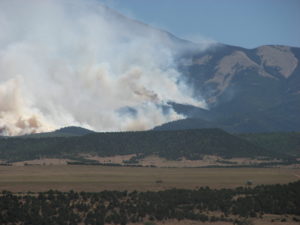
East Peak Fire, Huerfano County, CO 2013
Can I forgive myself for living in this lovely green, lush, landscape where we do still have water? Can I forgive myself for reading the signs of what was to come in the long, unending drought and fires in my old place and leaving before I was forced out by climate change and fire? Can I forgive myself for the mother, daughter and sister I was and am? Can I forgive myself for loving, trusting, hoping, believing, trying, accommodating, pleasing and failing? Can I forgive myself for all the years of neglect, silencing and abuse I colluded with and perpetrated toward myself? Can I forgive myself for now recognizing and responding to my own feelings and needs first? Can I forgive myself for writing or speaking the simple truth?
Forgiveness is a slippery concept, like tolerance. I don’t think of forgiving as forgetting. I’d be foolish to forget what I’ve learned as I interact with others. I’ll cripple myself if I don’t forgive. For me, forgiveness is an integral part of loving. Forgetting is not. Nor do I equate forgiveness with trust. Trust can be lost and rebuilt, but it takes time. Trust depends on forgiveness, but forgiveness doesn’t necessarily include trust.
I’m not at all sure we can create a better world together without forgiveness. I’m quite sure we won’t forgive one another if we’re unable to forgive ourselves. As resources shrink, we’re going to be forced onto a more level playing field in terms of our standard of living. Some of us have a lot more to lose than others. The have-nots are filled with rage. The haves are filled with fear.

Photo by Evan Kirby on Unsplash
There will be a lot to learn in the years ahead. I might as well start now to work with forgiveness, to befriend it, to embrace it, and to talk about it. Forgiving and letting go are both easier for me to do externally than internally, but internal work is the one place where we all have equal power. That’s where it must begin. We’re going to need our power, and we’re going to need to manage it well in order to survive. When our houses, businesses, cars and stuff disappear in fire, storm and flood, when our arable land becomes too hot to grow food, when no water comes from the tap and when money no longer allows us to pretend it’s not all happening, then we will rediscover what true power is, and then perhaps we can begin to bless the ground between us, forgive what has come before, and find new ways to collaborate and cooperate with the living system we call Earth.
In the meantime, I think I’ll stop begging others for forgiveness and concentrate on the places where I have power. Others may think of me as unforgivable, but I needn’t agree, and no one can prevent me from forgiving another.
“The weak can never forgive. Forgiveness is the attribute of the strong.”
― Mahatma Gandhi, All Men are Brothers: Autobiographical Reflections
My road to self-forgiveness may be long. It’s hard to take back the power of forgiveness, because now I have to be responsible for granting or withholding it. In some ways, it’s easier to beg others for it. If it’s not forthcoming from others, well, it’s not my fault. The path of self-forgiveness, though, is all up to me. It will be interesting to discover what sort of shame, guilt and self-loathing lurk in my internal terrain. It will be interesting to challenge the power of what others think and navigate by my own stars and compass. It will be interesting to put out fires on my side and observe whether others are invested in keeping them smoldering or assist in quenching them so the ground between us can heal.
Here’s a poem by Wendell Berry mapping the journey of self-forgiveness. It’s a good map. I’m taking it with me.
Do Not Be Ashamed
You will be walking some night
in the comfortable dark of your yard
and suddenly a great light will shine
round about you, and behind you
will be a wall you never saw before.
It will be clear to you suddenly
that you were about to escape,
and that you are guilty: you misread
the complex instructions, you are not
a member, you lost your card
or never had one. And you will know
that they have been there all along,
their eyes on your letters and books,
their hands in your pockets,
their ears wired to your bed.
Though you have done nothing shameful,
they will want you to be ashamed.
They will want you to kneel and weep
and say you should have been like them.
And once you say you are ashamed,
reading the page they hold out to you,
then such light as you have made
in your history will leave you.
They will no longer need to pursue you.
You will pursue them, begging forgiveness.
They will not forgive you.
There is no power against them.
It is only candor that is aloof from them,
only an inward clarity, unashamed,
that they cannot reach. Be ready.
When their light has picked you out
and their questions are asked, say to them:
“I am not ashamed.” A sure horizon
will come around you. The heron will begin
his evening flight from the hilltop.

Photo by Yuan Yue on Unsplash
All content on this site ©2018
Jennifer Rose
except where otherwise noted
by Jenny Rose | Apr 19, 2018 | Aging, Connection & Community, Emotional Intelligence
It’s strange to be aging, isn’t it? It doesn’t matter if you’re in your 20s or 60s, getting older is a remarkable experience. As I move through my 50s, I see more and more of my life when I look over my shoulder and I no longer have the feeling of limitless horizons in front of me. Whatever is ahead, it’s not limitless.
I have a friend who looks at a tape measure and finds the number of inches corresponding to his age. He takes in the distance between the end of the tape and his place at 70 something. Then he puts his finger at another 10 years, another 15 years. The visual on this exercise is startling. What happened to all those years of our life, and when did we move so close to our last day?

Photo by Cristian Newman on Unsplash
For at least a decade now I’ve been watching my elders and trying to figure out how to age gracefully. Every now and then I meet a remarkable elder. They have a twinkle in their eye, they laugh a lot, they’re curious and interested and they’re wonderfully authentic. I want to grow up to be just like that.
I’m convinced the great keys to aging gracefully are staying in intimate connection with ourselves every single day, no matter how old we are, and embracing change like a lover. Without consent and resilience, aging becomes a bitter battle to the end.
So many of us, as we age, live increasingly in the past. It’s understandable. We’ve been, done and seen a lot. The problem is as the years roll over us we don’t update our software. We hang on to what we were, what our bodies could do, how it all was during a time we remember as the best time (or at least a better time than now). We continue to define ourselves by outdated habits and routines. I’m not sure if this is a function of nostalgia or weariness or just plain laziness, but somewhere along the way we cross some invisible finish line, stop paying attention to embracing how things are right now and start waiting to die.
As our software gets more and more out of date, incompatibilities arise between how we show up in the world and our stories and memories. We lose credibility and effectiveness.
It seems to me the day we stop being curious about what we might learn, do or be next is the day our lives really end. People who age gracefully still have plans. They still dream. Their thinking remains flexible, even if their bodies don’t. They find some magical balance between letting go and moving forward. Change becomes a beloved friend rather than a feared enemy.
It’s not hard to see this in small external ways. We hang on to clothing, for example, that no longer fits, or was fashionable for a fleeting moment fifteen years ago. We hang on to books or movies or music we once loved and couldn’t do without, but now have outgrown. I don’t suggest there’s anything wrong with such nostalgia, but I do think all that stuff can pile up around us and block a clear view of what is now, or what might be ahead. Too often, the externals mirror our internal habits.
I notice many people my age still describe themselves by a job or position they no longer have. Some folks seem almost apologetic about being retired, as though they’ve lost personhood in the world, have become nobody. Others tell you all about some beloved skill or activity, how they practiced it, the ways it enhanced their life, their mastery, but never mention it was all long ago and right now, today, that activity is no longer part of their lives. Their lives have changed, but they haven’t updated their sense of identity. They’re stuck in their past and missing their present. They dangle in the empty gap between who they were and the stranger they are now.
I think some people feel angry about aging. We want our bodies to look, feel and perform the way they used to. We refuse to adjust to our present physical realities because they don’t match what we used to be able to do. We’re ashamed of our changing bodies rather than comfortable in them. We fear the changes the years bring and try to hide them or resist them.
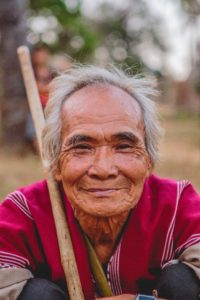
Photo by Capturing the human heart. on Unsplash
Then there are people, amazing people, who know the trick of beginning over and over again throughout their lives. They spend their professional years as a lawyer and then retire and become an artist. A woman marries, works, raises a family and then, divorced and in her 60s, begins traveling all over the world. People in their 50s and 60s go back to school and acquire a new skill or a degree. They live in the day they’re in, in right now, and they’re focused on the present and future rather than the past. They accommodate their physical needs, feel at home in their skin and are constantly updating their identity, intentions, connections and contributions.
Defining ourselves by our pasts is a sad business. I know aging can feel limiting, but I think the real limiting factor in aging is refusing to participate in it! Defining ourselves by what we can’t do, don’t do or once did (but no longer) is a terrible way to live at any age, but in old age it becomes a pernicious habit indeed. After all, anyone may have physical limitations at any age. Those limitations needn’t define us unless we invite them to.
Considering what is possible, what we can do, what we’d like to do and what we’ve always wanted to do — now, there’s a set of questions for living a full, rich life, today and tomorrow. An elder who draws wisdom from years of experience and has a well-exercised sense of humor, curiosity and the ability to learn is indomitable, irrepressible and irresistible.
Life brings many things, including devastating loss, injury and illness. Every day we live we’re aging, and every day is a new gift we might choose to receive, or we might turn away and look only at the old gifts, the old days, all that came before when we were younger, better looking, stronger, more hopeful, more innocent.
I know what’s behind me. Some of it was grand and some very painful indeed, but it’s all over, good and bad. Many of the clothes I wore, the thoughts and beliefs I held firmly onto, the meaningful routines and rituals in my life, are like so many dropped leaves, fluttering in the wind of my passing. I have no idea how much time I have left or what’s in front of me, but there’s so much I still want to do! Still, I cling to the past in some ways. I tell myself such-and-such (a lovely, longed-for thing) will never happen again. I say I can’t do XYZ instead of I’ve never done it before and will you teach me how? I feel frustrated and old when I wrestle with a 40-lb bag of bird seed and my back hurts for three days. I can be just as lazy, sulky, resistant and weary as anyone else.
Yet I’m convinced enormous grace lies in aging, if we can find it. I believe aging is full of invisible gifts, insight and strength. I want that grace. I don’t want to miss the last part of my life because I’m refusing to be present with it. I want to take the time to close all my programs and apps and let my psyche and body update and reboot regularly.
Aging with grace is a work in progress. Some days are more graceful than others.

Photo by ivan Torres on Unsplash
All content on this site ©2018
Jennifer Rose
except where otherwise noted
by Jenny Rose | Mar 22, 2018 | Power
Resilience is “the capacity to recover quickly from difficulties.” (Oxford Dictionaries.) One of the most prevalent difficulties in modern life seems to be the ever-growing cacophony of Those Who Are Offended. I’ve been thinking about this for some time, but last week I read an interview with author Lionel Shriver that brought my own sense of offense to a head. Here’s a quote from that article:

Photo by Syd Wachs on Unsplash
“Shriver … is not the first to argue that the right to give offense is one of the very foundations of freedom of speech. ‘We’re moving in the direction of enshrining the right not to be offended, which is the end of liberty and certainly the end of good books.'”
Oxford Dictionaries defines offense in four ways:
- A breach of law or rule; an illegal act.
- A thing that constitutes a violation of what is judged to be right or natural.
- Annoyance or resentment brought about by a perceived insult to or disregard for oneself or one’s standards or principles.
- The action of attacking someone or something.

Photo by David Beale on Unsplash
The principle of free speech is taking a real battering in the United States. It’s a one-size-fits-all justification for whatever beliefs and ideologies we espouse. Freedom of speech, however, is not absolute. There are limitations around it intended to protect community and individual rights, including the “offense principle,” a restriction based on perceived offense to society. Freedom of speech is a principle that relies on social guidance, which is to say the intelligence and compassion of us, we the people.
This is a problem in a nation where compassion is daily more distorted and taken advantage of and critical thinking and civil discourse are increasingly difficult to come by. Who gets to define “perceived offense to society?”
Everywhere I look, listen and read, I observe people who appear to believe they have a right not to be offended. Freedom of speech grants such people the right to be offensive, as they’re quick to point out, but it’s only a one-way street. Offensive ideas and beliefs are becoming a broad category. Disagreement is offensive (and hateful and bigoted). Certain words, like ‘uterus’ are becoming offensive. Certain pronouns are offensive. Real or perceived exclusion is offensive. A perception of cultural appropriation is offensive. Identity politics of any sort are offensive. Science and evidence-based thinking are offensive. Name any religion or spiritual framework you like — it’s offensive.
When did we become so precious, infantile and entitled that we stopped dealing effectively with being offended?
When did the cancer of selfishness destroy our willingness to consider the needs of those around us?
When were individual distorted perceptions given power over a larger, more common good?
When did disagreement, questions and citing scientific data begin to earn death threats?
Our social, cultural and political landscape is enormously complex, at least at first glance. We’ve become fantastically and gleefully skilled at silencing, deplatforming, invalidating, gaslighting, projection and the fine art of withering contempt. We suffer from an epidemic of what I call Snow White Syndrome. Remember the wretched queen stepmother and her mirror? “Me, me, ME, not you! I’m the fairest, I’m the best, I’m the most victimized, I’m the most downtrodden, I’m the richest, I’m the most offended!”
At first glance, as I said, it’s all so complex. At second glance, it’s all distraction and bullshit. The bottom line is always a power dynamic. Is an individual or group requesting or demanding power-with or power-over?
It really is that simple.
I’m offended every single day. School shooters offend me. Tantruming and pouting politicians offend me. Silencing tactics offend me. Being forced to deal with the sexual fetishes of others offends me. The list goes on and on. You know who’s responsible for dealing with all this offense?
Me.
It’s not your responsibility to refrain from offending me, and it’s not my business to tippy-toe around your delicate sensibilities, either. Many of us try to approach others with kindness and courtesy, but that doesn’t mean we’ll receive either in return. I don’t expect the world to accommodate me. Life is not fair. Equality is an ideal rather than a reality. Inclusivity is not a right.
My rights and needs are as important, but not more important than anyone else’s.

Photo by James Pond on Unsplash
Individuals and groups who lobby to take away the rights of others work from a power-over position. They’re weak and fearful and use violence and intimidation to distract others from their impotence. Individuals and groups who lobby to create more equal power dynamics work from a power-with position. They’re confident and seek authentic connection through information sharing and constructive contribution toward the well-being of all.
Resilience, not priggish rigidity or sheep-like agreement with the prevailing social fashion, always wins the evolutionary jackpot. Resilient life flexes and bends, masters new environments, learns and successfully reproduces, continues. Life that doesn’t dies. Evolution is not personal. It makes no distinctions between a human being and a cockroach. Evolution has a lot of time, millions upon millions of years. The ebb and flow of species on earth is nothing but ripples. Patiently, intelligently, life begins again, over and over, building its complex web.

Photo by Biel Morro on Unsplash
If we can’t figure out how to live in harmony with our bodies, our communities and the earth, we will be deselected. Walking around with a mouth like a pig’s bottom because we’re offended, mutilating and poisoning our bodies, creating sexual pathology that interferes with our ability to reproduce our DNA, wasting our time and energy engaging in idiotic arguments and eradicating education and critical thinking will all lead to deselection, and it should. Such a species is more destructive than constructive to all the other forms of life on this planet.
Difficulties of all kinds are a given. They always have been. Difficulties are the pressures that shape us and make us stronger — or deselect us. If we want to survive, we need to put aside our offended sensibilities and concentrate on the things that contribute to the stuff of life: food, water, shelter, connection, raising healthy children, our physical and mental health and the well-being of Planet Earth. It seems to me that’s enough to be going on with. If we can’t begin to achieve resilience, the debate over who gets to use which bathroom becomes as moot as it is ridiculous.
Resilience can be learned. We foster it by letting go, learning to be wrong, exercising our intelligence, and forming healthy connections so we can learn from one another, figure out how to share power and support one another. Life was never advertised as a free ride. The privilege of life comes with responsibility, demands and competition. Taking offense is not a life skill. Malignant destruction of life, either our own or somebody else’s, is not a life skill. Taking our proper place in the food web and the natural cycles of life and death, on the other hand, is essential if we expect to continue as a species.
Life, in the end, is for those sensible enough to live it, and part of surviving and thriving is resilience. Maybe, if we can get a grip and refocus on what matters, we can learn from the cockroaches, viruses, bacteria, mice, flies, ants, crows, soil organisms and many others that have figured out how to adapt and evolve through every difficulty they encounter.
Offended? Get over it.

Photo by Jonathan Simcoe on Unsplash
All content on this site ©2018
Jennifer Rose
except where otherwise noted
by Jenny Rose | Nov 2, 2017 | A Flourishing Woman, The Journey
In the Neopagan Wheel of the Year, Halloween is the modern secular version of Samhain (SOW-in), the last harvest festival, a time when the veil between the spirit and corporeal world is thin and we prepare for the peace and rest of winter. It’s a time to let go of that which no longer serves us.
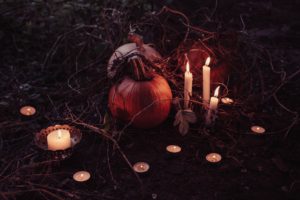
Photo by freestocks.org on Unsplash
This year Samhain was ushered in by the remains of Hurricane Phillippe, which battered Maine and other parts of the Northeast with high wind and heavy rain.
Wind is an old familiar of mine, as the place I came from in Colorado was extremely windy. There, the wind blows relentlessly for days and nights on end sometimes, a steady roar from one direction that fills the air with sand, grit, trash and other debris, frequently exceeding 60 mph and occasionally 70 mph. It’s the kind of wind nobody wants to go out in and it ground away at our nerves, making us feel housebound and irritable enough to climb the walls. It sucked all the moisture out of the ground, the plants and our skin. It tore roofs off sheds, blew down fences and trees, closed vulnerable highways and sent trampolines into the air.
The gale we had here this week was a different kind of wind. It came from all directions in gusts. It made the house groan and the trees thrash. It tore shingles off the roof and downed hundreds of trees. More than five inches of rain fell in billowing curtains. As a result, many thousands of people lost power, roads are blocked and it may be the end of the week before all the repair work is finished.
The storm hit us in the wee hours. We were awakened by an exploding power transformer somewhere close by, probably because of a fallen tree.
When I went out for my morning walk, I found change.
Several large trees have snapped off and lay or lean, the exposed raw wood pale and jagged. One less tree in a patch of thick forest is a subtle change to my eyes, but to the life surrounding it for several feet in every direction it’s a dramatic turn of events. It changes the light. It changes the nutrient demand underground. It feeds the mycelium and other organisms that will break down the wood. It gives new opportunity to young trees and other plants.
All the trees that came down on our land looked unhealthy, and several were rotting in place and collapsed rather than sheared off. Lots of dead branches tore away, too, and cones were flung far and wide.
As I walked, I reflected on change. Millions of people are experiencing unprecedented storms now. In just a few hours, whole lives are swept away by powers we cannot control. But the wind of change can also be a breeze, a zephyr we hardly notice, even if we practice daily presence with ourselves and our surroundings. Change is always with us, as inevitable as death.
More often than not, I fight with change. I don’t mind the idea of change, per se, but I want it to be on my terms. I want to control it. In my own life, though, change has often come unexpectedly and catastrophically, sometimes in the form of a seemingly insignificant moment in which I suddenly see. I suddenly assimilate a vital piece of information. A veil tears and I discern what lies behind it. In an instant, everything changes, and at the same time it doesn’t, at least not more than usual.
Yet I am changed, and I can never go back.
In a few days, things will normalize in Maine, but the landscape is altered now. It will never quite be the same again, although our experience was trivial compared to Texas, Puerto Rico and many other places.
Walking our boggy fields alongside the river, my old boots leaking at a split seam, it seemed to me the greatest gift of Samhain is the opportunity to allow wind and storm, to revel in them, to join power and energy with them, come what may in the aftermath. I stood watching the river, filled right to its brim, running muscular and turbid, crowded with tree debris and occasional trash. Several tree skeletons that had leaned on its banks were gone.
There can be a glorious sort of power in letting go, in spite of fear and resistance. I discovered that in Colorado. As I walked, it was still quite windy and wet, the landscape waterlogged and disheveled. Halfway through my walk I discovered a tick crawling on my hand, and a quick inspection of my head-to-toe canvas army supply rain cape revealed several more. I scraped off those I could see with a stick while I paused at my second river overlook to watch the water and then navigated a large old white spruce that had fallen across the mowed path and went home to do a lengthy and soggy tick check. The final count was 13, by the way.
Collaborating with a storm like this is good work for Samhain. I’m content. The forest has been culled and renewal will follow. New life will come into every space that was emptied. Our streets and roads, blocked with fallen trees and sagging power lines, look devastated rather than graceful and elegant. Thousands of people are managing without power. Yet the wind cleansed us of dead and dying life, whether or not we were ready or consented.
Now there’s no choice but to go on, to step into the diminishing light of winter, to face whatever the future brings, to replace what no longer serves with something more powerful. I want to leave you this week with a poem I wrote in October, 2012.
Wind
Come, wild wind, sweep across the sky and loosen the world!
Rise, wind, blow! I summon you with breath and breath again!
Blow, wind, roar! I command you from the center of loss!
Roar, wind, howl! Fling me open. Tear all the pretty things away.
Peel my lips from my teeth and flay me to pieces.
Lend your voice to mine and scream me into clean bones.
Scream!
Let us sever and rend together!
Strew the tatters of my dreams across stubbled fields and in dusty streets!
Rage, wind, exult!
You think you bend me to your will?
You take nothing I do not surrender.
You weaken and end before I do.
And when tumult has passed I will call myself home from wherever I am scattered.
I shall gather the rags of what has been and shape them into a sail and you shall fill it and take me onward.

Photo by Kelly Sikkema on Unsplash
All content on this site ©2017
Jennifer Rose
except where otherwise noted
















